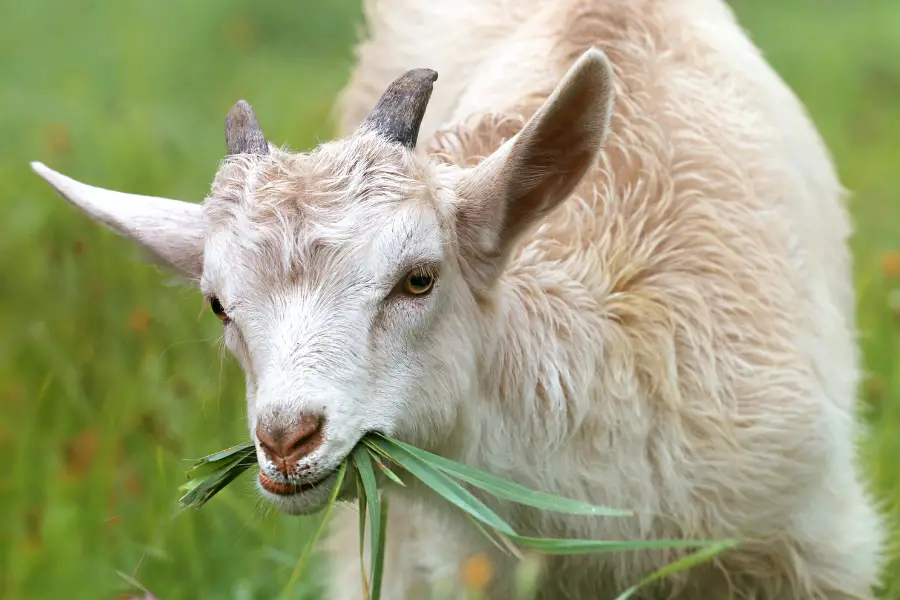
Goat’s milk has been gaining popularity in recent years as an alternative to cow’s milk, and many people are interested in knowing about its nutritional content. One common question is whether goat’s milk is a good source of vitamin D, a vital nutrient required for maintaining strong bones and overall health. In this article, we will discuss the level of vitamin D in goat’s milk, along with its other nutritional benefits and how it compares to other types of milk.
Table of contents
Goat’s Milk, Vitamin D, and other Nutrients
Goat’s milk has a unique nutritional profile that sets it apart from other types of milk. While it does contain trace amounts of vitamin D, it is not a rich source of this essential nutrient. Commercially available milk, however is typically fortified with Vitamin D. Both fortified and unfortified goat’s milk is a good source of other important nutrients such as protein, calcium, and potassium. When comparing goat’s milk to cow’s milk, it has more calories, fat, and slightly more protein, while cow’s milk contains more vitamin B12.
Key Takeaways
- Goat’s milk is not a rich source of vitamin D but has other essential nutrients.
- It has more calories, fat, and slightly more protein compared to cow’s milk.
- Goat’s milk is a good alternative for those with allergies or lactose intolerance.
- Goat’s milk sold in grocery stores is fortified with Vitamin D.
Goat’s Milk Nutritional Profile
Goat’s milk is a nutritious alternative to cow’s milk, providing several essential vitamins, minerals, and other nutrients. This section will highlight the nutritional profile of goat’s milk, focusing on Vitamins and Minerals, Calories, Fat, and Protein, as well as Carbohydrates and Sugar.

Vitamins and Minerals
Goat’s milk is a rich source of various vitamins and minerals. Some of the key micronutrients found in goat’s milk include:
- Vitamin D: 3mcg (15% DV) (when fortified)
- Calcium: 300mg (25% DV)
- Potassium: 420mg (9% DV)
- Phosphorus: (16% DV)
- Magnesium: (8% DV)
- Iron: 0.1 mg
- Selenium: 0.8 mcg
- Copper: 0.1 mg
- Manganese: 0.03 mg
It’s worth noting that goat’s milk is not a significant source of Vitamin C or Vitamin K.
Calories, Fat, and Protein
A serving of goat’s milk (approximately 244g or 1 cup) contains:
- Calories: 168
-
Fat: 10 grams
- Saturated fat: 6.5 grams
- Monounsaturated fat: 2.7 grams
- Polyunsaturated fat: 0.4 grams
- Protein: 8.7 grams
Carbohydrates and Sugar
Goat’s milk contains carbohydrates in the form of sugar (lactose) and provides the following per serving (244g or 1 cup):
- Carbohydrates: 10.9 grams
- Sugar: 11 grams (naturally occurring lactose)
- Fiber: 0 grams
Overall, goat’s milk is a nutrient-dense food providing a well-rounded mix of vitamins, minerals, and macronutrients. While it’s a dairy product and contains lactose, it’s often considered to be easier to digest for lactose-intolerant individuals due to its unique structure, making it a valuable addition to many diets.
Comparing Goat’s Milk to Other Milks
Cow’s Milk vs. Goat’s Milk
When it comes to nutrients, goat’s milk and cow’s milk have similarities but also exhibit differences. Goat’s milk contains 8 grams of protein per cup, and it is an excellent source of calcium, potassium, phosphorus, and magnesium. In comparison, cow’s milk offers around the same amount of protein and calcium but has slightly lower levels of magnesium and potassium.
One significant difference between these two types of milk is the lactose content. Goat’s milk has 12% less lactose per cup than cow’s milk, making it a more suitable option for people with mild lactose intolerance.
Another important distinction is that goat’s milk contains smaller fat globules, which can lead to better digestibility and may be easier to digest for some people. Lastly, the levels of vitamin D in both milks are relatively similar, with goat’s milk containing 1.3 µg vitamin D per 100 grams and cow’s milk containing 1.2 µg vitamin D per 100 grams.
Plant-based Milks vs. Goat’s Milk
When considering plant-based milks like soy, almond, and rice milk, there are some key differences in their nutrient profiles as compared to goat’s milk. Plant-based milks are often lower in protein, calcium, and other essential minerals than goat’s milk. However, they are usually fortified with added vitamins and minerals, including vitamin D, to match the nutritionally equivalent dairy milk.
- Soy milk: This milk is an exception among plant-based milks as it contains a comparable amount of protein to goat’s milk but lacks in calcium, potassium, and other essential minerals, unless fortified.
- Almond milk: Typically lower in protein and calcium than goat’s milk, it is often lower in calories, making it a popular choice for weight-conscious consumers. Most commercial almond milk products are fortified with vitamins and minerals.
- Rice milk: Rice milk is naturally low in protein, calcium, and essential minerals, making it important to choose fortified versions for better nutritional value.
While goat’s milk and plant-based milks serve different dietary needs and preferences, they all provide varying levels of nutrients and health benefits. In terms of vitamin D content, it is essential to look for fortified plant-based milks in order to meet one’s daily requirements, while goat’s milk contains a good natural amount of vitamin D. Keep in mind that individual nutritional needs and dietary restrictions will ultimately determine the best choice of milk for each person.
Health Benefits of Goat’s Milk
Bone Health
Goat’s milk is an excellent source of calcium and phosphorus, which are essential minerals for maintaining strong and healthy bones. Calcium is vital for bone development and growth, while phosphorus helps optimize the proper use of calcium in the body. In addition, when fortified, goat’s milk is a good source of vitamin D, which aids in the absorption of calcium. With 300mg of calcium (25% DV) and 420mg potassium (9% DV), incorporating goat’s milk into your diet can be beneficial for bone health.
Improved Digestion
Many people find goat’s milk easier to digest than cow’s milk, as it contains less lactose. This makes it a suitable alternative for individuals who are lactose intolerant. Additionally, the smaller fat globules in goat’s milk are easier for our bodies to break down compared to those found in cow’s milk. Furthermore, goat’s milk also contains a higher amount of medium-chain fatty acids, which can be quickly absorbed and utilized by the body.
Immune System Support
Goat’s milk is rich in various nutrients that play a vital role in supporting a healthy immune system. For instance, it is an excellent source of vitamin A, a powerful antioxidant that helps protect our body against infections. Moreover, goat’s milk contains a good amount of protein (9 grams/g), which is crucial for the proper functioning of the immune system. Beyond these essential nutrients, goat’s milk also contains traces of beneficial minerals like iron, copper, and zinc, which further contribute to immune system support.
Allergy and Lactose Intolerance Considerations
Goat milk is considered a nutritious alternative to cow’s milk for some individuals, as it offers a similar range of nutrients, including calcium and vitamin D (both cow’s milk and goat’s milk usually have Vitamin D added to them when sold commercially). However, it is essential to bear in mind the allergy and lactose intolerance considerations when adding goat milk to your diet.
People with lactose intolerance may experience digestive issues when consuming dairy products, including goat milk. This is because lactose, a sugar found in dairy products, is not adequately broken down in their digestive system. Goat milk does contain lactose, but in slightly lower levels compared to cow’s milk. As a result, some individuals may tolerate goat milk better, while others may still experience symptoms of lactose intolerance.
Milk allergy is different from lactose intolerance and should not be confused with it. A milk allergy is when a person’s immune system reacts to the proteins present in milk, leading to allergic reactions. Although goat milk and cow’s milk contain different proteins, cross-reactivity may occur, and people allergic to cow’s milk may still be allergic to goat milk. It is crucial to consult with a healthcare professional before incorporating goat milk into your diet if you have a known cow’s milk allergy.
Parents should be cautious when introducing goat milk to their children, as goat milk is not suitable for infants. Both cow’s milk and goat milk can be harmful to infants due to their inability to adequately digest the proteins and other components present in these dairy products. It is always recommended to rely on breast milk or formula for infants’ nutrition.
In conclusion, while goat milk can be a valuable addition to some people’s diets, providing essential nutrients like vitamin D, it is important to be aware of potential allergy and lactose intolerance considerations. Consulting with a healthcare professional and understanding one’s individual dietary needs is essential before adding goat milk to your diet.
Tips for Using Goat’s Milk
Incorporating Goat’s Milk into Recipes
Goat’s milk is a versatile dairy option that can be easily incorporated into various recipes. It is a nutritious alternative to cow’s milk, offering unique health benefits such as being less inflammatory and easier to digest. To make the most of goat’s milk in your cooking:
- Substitute cow’s milk: In most recipes, simply replace cow’s milk with goat’s milk in a 1:1 ratio.
- Smoothies: Add goat’s milk to your favorite smoothie recipes for an extra boost of nutrition.
- Baking: Use goat’s milk in your baking recipes, like cakes, muffins, and pancakes, to enhance the flavor and nutrient profile.
- Soups and sauces: Goat’s milk can be used in place of cow’s milk or cream to create a creamy texture for soups, sauces, and gravies.
Goat Milk Products and Alternatives
For those interested in incorporating more goat’s milk into their diet, there is a variety of goat milk products and alternatives available. These include:
- Yogurt: Goat milk yogurt is a tasty alternative to traditional cow’s milk yogurt and comes in different flavors. It is often recommended for individuals with a lactose intolerance or sensitive gastrointestinal tract.
- Cheese: Goat’s milk cheeses, like chèvre and feta, are popular options, offering unique flavors and textures compared to cow’s milk cheeses.
- Ice cream: For a delicious and lactose-sensitive-friendly treat, try goat milk ice cream, which can be found in a range of flavors.
- Dairy-free alternatives: If you’re seeking dairy-free or vegan options, consider plant-based milks such as almond, soy, or oat milk. These substitutes can provide similar nutritional benefits to goat’s milk.
In summary, goat’s milk is a nutrient-rich alternative to traditional dairy products that can be easily incorporated into a variety of recipes and dishes. Experiment with different goat milk products and dairy alternatives to enhance both your cooking and your overall nutrition.
Video – Vitamin D in Goat Milk and Cow Milk
In this official video from the American Council on Science and Health, you will find out why milk (goat and cow milk) is fortified with Vitamin D.
Frequently Asked Questions
Goat milk, particularly if it’s not fortified, does not generally contain a significant amount of vitamin D. However, store-bought and fortified goat milk does provide around 20-25% of the daily recommended intake per cup.
Goat milk is not inherently higher in vitamin D than cow milk. In fact, they both contain a minimal amount of vitamin D if they are not fortified. However, some fortified milk products, either goat or cow milk, can have similar levels of vitamin D.
The Vitamin D content in unfortified goat milk is relatively low. However, fortified goat milk can contain between 20-25% of the daily recommended intake of vitamin D per cup.
Compared to other foods that are naturally rich in vitamin D, such as fatty fish and mushrooms, goat milk’s vitamin D content is relatively low. However, when fortified, goat milk can provide a moderate amount of vitamin D, making it a worthwhile addition to your diet.
Yes, goat milk is a great source of calcium and, when fortified, can provide a moderate amount of vitamin D as well. Alongside other nutrients such as protein, potassium, phosphorus, and magnesium, goat milk is an excellent option to include in a balanced diet.
Meyenberg goat milk is fortified with additional nutrients like vitamin D, making it a good source of calcium and other essential nutrients. This increases its nutritional value compared to unfortified goat milk.




